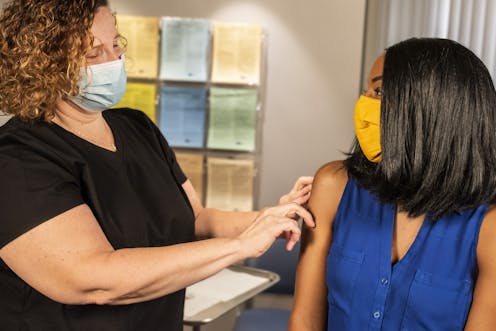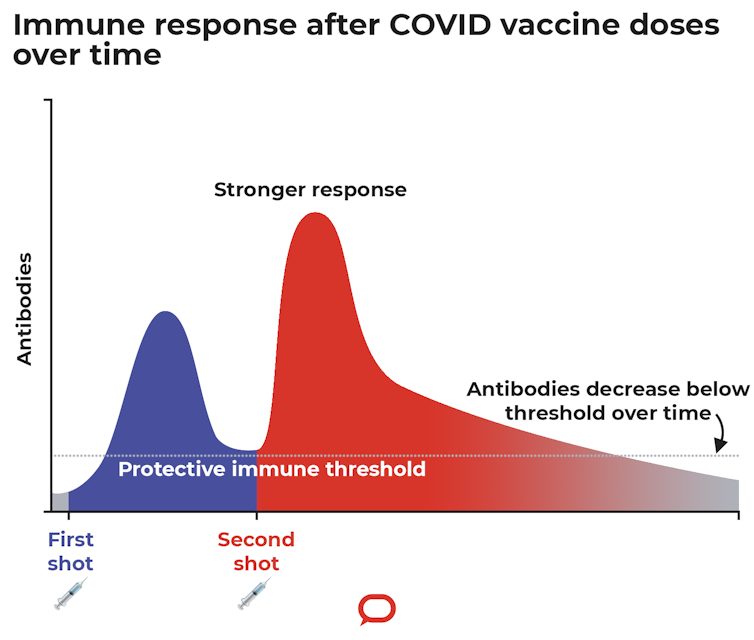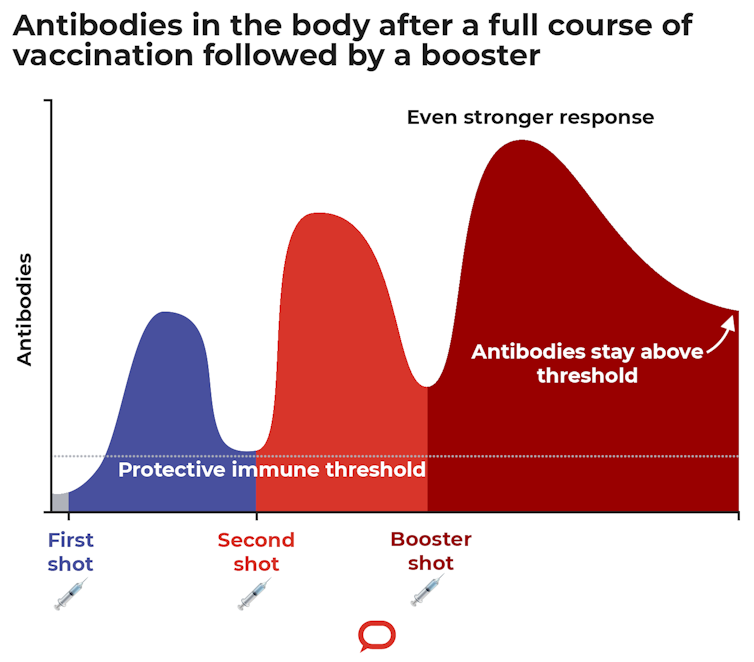Source: The Conversation (Au and NZ) – By Cyra Patel, Senior Research Officer, National Centre for Immunisation Research and Surveillance; PhD candidate, Australian National University

If it’s been six months since you got the second COVID vaccine dose, it’s time to book in for your booster shot. This will provide additional protection against COVID, including the new Omicron variant.
While the evidence is still emerging, preliminary data suggests a Pfizer booster might give the same protection against Omicron as double-dose vaccination did for the original strain.
Why get a booster?
When you get your first dose of COVID vaccine, your body produces an immune response against a part of the virus called the spike protein. If you’re exposed to the SARS-CoV-2 virus, your immune system can recognise and fight the virus quickly.
The immune response to a single dose of COVID vaccine is generally short-lived. So a second dose is needed to have a stronger and longer-lasting response.
Over time, the amount of antibodies in your body decreases – this is referred to as waning immunity.
If the immune response wanes below the level needed for protection against COVID – the “protective threshold” – your immune system may not be able to prevent infection when exposed to the virus.
Vaccine doses given some time after the initial course help boost the level of antibodies above the protective threshold.

The Conversation, CC BY-ND
How much does immunity wane after 2 doses?
Antibodies decrease over a period of six months or more after the second dose of COVID vaccine.
Vaccine effectiveness against COVID infection decreases, on average, by 18.5 percentage points, six months after completing vaccination.
On a positive note, protection against serious COVID illness, including hospitalisation or death, does not seem to be reduced to the same extent, only by about 8 percentage points.
This is likely because other components of the immune response (T cells and immune memory cells) stay in the body for longer than antibodies and prevent serious illness.
Waning protection is more of a concern among elderly and immunocompromised people because they tend to have weaker immune responses to vaccines compared with young, healthy people.
How effective are booster doses?
Antibody levels after a booster dose are higher than those after the initial vaccination course.
Although protection against COVID infection from two doses was slightly lower against Delta than the original strain, a booster dose restores protection to the same level.
In Israel, people who received a booster dose (five or more months after completing vaccination) had infection rates ten times lower than in people who had only received the initial two-dose course.
From a safety perspective, the types and frequency of side effects after the booster dose have been similar to first and second doses.

The Conversation, CC BY-ND
Which vaccine should I get as my booster dose?
The two mRNA COVID vaccines available in Australia – Pfizer and Moderna – are so far approved for use as a booster dose.
A recent clinical trial showed several COVID vaccines, including all three currently available in Australia (Pfizer, Moderna and AstraZeneca), and the Novavax and Janssen vaccines, produce strong immune responses after a course of either Pfizer or AstraZeneca vaccines.
Read more:
When will I need my COVID vaccine booster shot? And can I switch to a different brand?
Based on what we know so far about immune responses to COVID vaccines, any of these vaccines given as a booster should be effective in reducing your risk of infection, regardless of which vaccine you initially received.
The highest immune responses were seen with mRNA vaccines, but it’s too early to tell whether these provide better protection against COVID infections when used as a booster, or how quickly immune responses will wane compared with the other vaccines.
When is the best time to get my booster dose?
Booster doses are timed to boost your antibody levels before they get below the protective threshold. The difficulty with COVID is we don’t yet know what the protective immune threshold is.
So the timing also involves other factors such as how much disease is in the community and vaccine availability. Some countries, such as the United Kingdom, have recommended getting a booster dose as soon as three months after the initial course.
The UK has much higher daily cases of COVID, and face the potential for increased Omicron cases in winter, when hospitals are often at capacity due to other common respiratory viruses including influenza. In that context, early boosters are like an insurance policy to prevent an overwhelming winter peak.
However, a shorter interval may mean the boost to the immune response is not as high or long lasting. A longer interval between the first and second dose of COVID vaccine is more effective.
Given the COVID virus is circulating at much lower rates in Australia than other countries and vaccine coverage is generally high, a booster dose six months after the initial course seems reasonable.
With this vaccination schedule, most adults in Australia will be eligible for their booster before winter 2022.
Will the booster protect me against Omicron?
We’re still learning how the new Omicron variant, with so many mutations, may change our existing immunity (from past infection or vaccination) to be less effective.
Early laboratory studies show two doses of the Pfizer vaccine provide some immunity against Omicron, but not as much as against previous strains. This means we’re likely to see more infections in fully vaccinated people.
However a booster dose appears to improve the immune response to a level similar to that observed against previous strains in fully vaccinated people, and is expected to provide good protection against serious illness.
As more data on the effectiveness of boosters emerges, and if Omicron cases increase rapidly, the recommended timing of booster doses may also change.
While we wait for more data to confirm the vaccines provide good protection against hospitalisation and death, we can take some comfort knowing early data indicate this variant may even be less severe than previous ones.
In the future, booster doses may be adapted for emerging variants, much like influenza vaccines are modified each year depending on what new strains are circulating.
The benefits of new vaccine technologies like mRNA is the time required to manufacture new variant vaccines is only about 100 days. So if a vaccine-resistant variant does arise, we might not need to wait too long for an updated vaccine.
![]()
Cyra Patel is an employee at the National Centre for Immunisation Research and Surveillance (NCIRS). NCIRS receives service contract funding from the Australian Government Departments of Health, NSW and other state government Departments of Health.
Robert Booy consults to all vaccination companies in Australia and works one day a week for Vaxxas. He has received funding from NHMRC and ARC in relation to vaccine research.
Jean Li-Kim-Moy does not work for, consult, own shares in or receive funding from any company or organisation that would benefit from this article, and has disclosed no relevant affiliations beyond their academic appointment.
– ref. Should I get my COVID vaccine booster? Yes, it increases protection against COVID, including Omicron – https://theconversation.com/should-i-get-my-covid-vaccine-booster-yes-it-increases-protection-against-covid-including-omicron-172965




